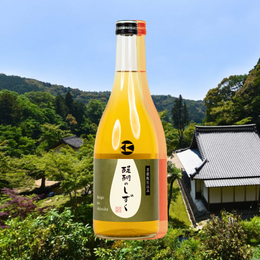
Hailing from Hyogo Prefecture, Kiku-Masamune is one of the most well-known sake breweries in Japan, and is also one of the oldest, being founded in 1659. Sakes from this brewery tend to be smooth but dry, and are said to compliment lighter Japanese dishes well such as soba or sashimi.
Just as Asahi Super Dry Beer revolutionised the beer industry with the introduction of the dry beer, Kiku-Masamune is credited with pioneering a new style of dry sake around the late 1800s to early 1900s. In the early days, sake breweries mainly produced sweet sakes. However, Kiku-Masamune became famous for producing a sake that had a pronounced crispness and dry taste. This resonated with changing palates beginning in the Meiji era (1868-1912) when Japanese society changed drastically and consumer tastes evolved and became "modernised."


Dry sake was (and still is) seen as more versatile in food pairing. Unlike sweet sake which can overpower or clash with the flavours of certain dishes, dry sake cleanses the palate and compliments a wide range of foods.
Kiku-Masamune's innovation and recognition of shifts in consumer preferences made it a standard in the industry. Their success and the growing preference for dry sakes among consumers influenced the sake industry to adjust its brewing techniques and produce drier sakes.
Interestingly, Kiku-Masamune has also made its mark in the beauty industry. The company produces several lines of popular skincare products that feature sake as a key ingredient - this includes lotions, face serums and bath salts. These skincare products harness the moisturising properties of sake, and have gained a strong following across Asia.

Now, the two Kiku-Masamune bottles we're tasting in this review are from the Shiboritate series. The word Shiboritate is roughly translated to "freshly pressed". This refers to the essential step in producing sake after fermentation when the clear liquid sake is pressed, filtered and separated from the solid pieces of rice (a step known as "shibori").

This is an important step of sake-making because the way a sake is pressed would determine the clarity, texture and flavour of the final product. For instance nigori or "cloudy" sake is loosely pressed, allowing rice particles to pass through to make a cloudy beverage.
The special thing about the Shiboritate series of sakes is that they are bottled immediately after pressing without the usual maturation period. This gives the sake a fresh, raw and robust character. These sakes are also brewed only during the winter months under the supervision of a senior sake brewer. They are also made from expensive Yamada Nishiki rice.
Let's give them a taste.
Kiku-Masamune Shiboritate 菊正宗 しぼりたて – Daiginjo – Review

Nose: Subtle blend of fresh melon and green apples, with a very light hint of fresh snow pear. Faint backdrop of brown rice.
Palate: Lightly sweet, reminiscent of a light honey drizzled on apple slices. The texture is medium in body, with a very mellow and smooth experience. Gentle sweet notes are quickly followed by tart notes of plum and a yuzu citrus zestiness, and a mild dryness at the back of the tongue.
Finish: Leaves a slight drying sensation, not overwhelming but just enough to cleanse the palate.

My Thoughts:
Overall, the Kiku-Masamune Shiboritate Daiginjo is straightforward and very easy to drink. It doesn't command a strong presence nor leave a lasting impression, but its mellowness and clarity makes it suitable for occasions when we want a sake that does not distract from the dishes at hand.
That said, my preference is for this to be a little more pronounced in dryness.
Kiku-Masamune Shiboritate 菊正宗 しぼりたて – Junmai Daiginjo – Review

Nose: Very vibrant and inviting array of fresh summer fruits. Bright notes of ripe banana and sweet pineapples, with a touch of lychee and just a hint of earthiness from shitake mushrooms.
Palate: A moderate sweetness and a smooth, medium-light texture. Opens with a robust note of bananas and vanilla, with steamed rice and light note of green Kyoho grapes.
Finish: Long and pronounced, with a clear refined note of steamed rice and a crisp aftertaste of sparkling white wine.

My Thoughts:
Compared to the Daiginjo bottle (above) which felt quite muted, the Kiku-Masamune Shiboritate Junmai Daiginjo offers a surprising and delightful burst of fruitiness. It has very vibrant and front-and-center fruity aromas, along with a memorable dryness and acidity.
This makes for a fantastic sake companion to richer dishes.

@CharsiuCharlie







